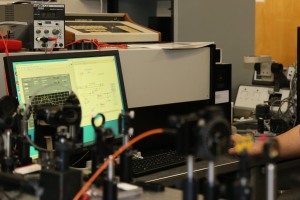The Sc.M. program in Mechanical Engineering and Applied Mechanics (ME) has a long tradition of excellence at Brown. ME is one of the most versatile engineering disciplines as it explores a wide range of systems spanning fluids and solids. Students from this concentration learn the science of motion, designing and analyzing systems that shape our world: From high-precision nanomechanical machines to large-scale aerospace systems. At Brown, ME students carve unique paths leveraging computational, analytical, or experimental methodologies with other areas of interest in the spirit of the open curriculum. They become distinguished scholars, engineering innovators, and management leaders. The curriculum in ME is intended to provide students with a broad interdisciplinary foundation complemented by specialized training in mechanical systems and fluid/thermal systems.
The objectives of the Brown University Mechanical Engineering Sc.M. Program are to produce graduates who will: (1) apply their knowledge of engineering, science, mathematics, and liberal arts to successful careers and leadership roles in industry, government, or academia; (2) apply independent, critical, and integrative thinking to a broad range of complex, multidisciplinary problems, and effectively communicate their solutions to broad audiences of diverse backgrounds; and (3) show a lifelong commitment to technical approaches that address the needs of society in an ethical, safe, sustainable, and mechanically responsible manner.
Students in the ME master’s program can study a broad range of topics including:
- Acoustics
- Complex fluids
- Fundamental fluid dynamics and heat transfer
- Mechanics of cells and biological systems
- Micro- and nanoscale fluids and materials
- Micro-electro-mechanical systems (MEMS)
- Multiscale materials modeling
- Soft matter
Program of study
Master of Science – Non-Thesis Option
Students take a total of eight courses to satisfy the degree requirements. Students are expected to complete the Master of Science – Non-Thesis program option in three semesters, taking three courses in the first and second semesters, and two courses in the third semester.
Master of Science – Thesis Option
Students take a total of eight courses, including independent reading and research courses. Students are expected to complete the Master of Science – Thesis program option in four semesters, taking three courses in the first semester, two in the second and third semesters, and one in the fourth semester. Students can switch between degree options during the program for greater flexibility. Students interested in pursuing the Thesis option usually identify a faculty advisor during their first or second semester at Brown.
Master of Science – Professional Option
In addition to the course requirements, a paid or unpaid experiential learning experience of 3-6 months is a required component of the professional track program. Experiential learning can include a summer internship or completion of ENGN 2960 (Experiential Learning in Industry (ELI)) as an elective course. Assistance in obtaining internships will be provided by the School of Engineering and Career Services and Professional Development in the School of Professional Studies.
